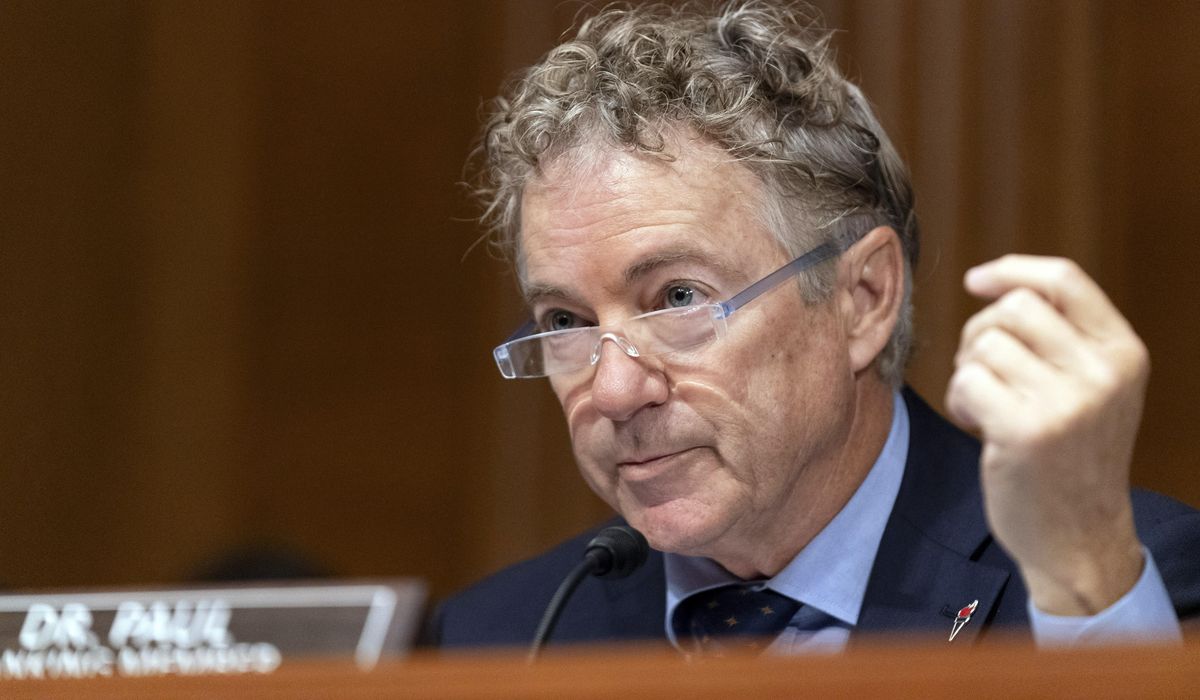‘Tis the season for Rand Paul’s ‘Festivus Report’ on the government’s wild spending

For Sen. Rand Paul, the holiday season is the most wonderful time of the year — to air his grievances about wasteful government spending.
The Kentucky Republican is highlighting $1 trillion in questionable use of taxpayer dollars in the tenth annual installment of his “Fetivus Report” — a tradition inspired by an episode of the “Seinfeld” television series in which family members share why they are disappointed in each other over a holiday meal.
“This year, I am highlighting a whopping $1,008,313,329,626.12,” Mr. Paul said in the preface to the 2024 analysis. “That’s over $1 trillion in government waste, including things like ice-skating ’Beards on Ice’ drag queens, a $12 million Las Vegas pickleball complex, $4,840,082 on Ukrainian influencers, and more!”
“No matter how much money the government has wasted, politicians keep demanding even more,” Mr. Paul said in the report.
Some of the big ticket items included $892 billion paid in interest on Uncle Sam’s Credit Card and $90 billion the government has spent on ineffective U.S. Navy Littoral Combat Ships, which the report renames “Little Crappy Ships.”
There is also the $15.5 billion promoting electric vehicles Americans “don’t want” and the $10 billion the federal government spent on maintaining, leasing and furnishing office buildings that have become virtual ghost towns in the post-COVID era when most government employees work from home.
Mr. Paul takes pride in being a fiscal watchdog.
He hopes the next Congress will start seriously tackling the federal deficits, bemoaning that lawmakers — “unsurprisingly, with hardly a second thought” — have pushed the national debt beyond $36 trillion from $34 trillion a year ago.
“Who’s to blame for our crushing national debt? Everybody,” he said. “This year, members of both political parties in Congress voted for massive spending bills, filled with subsidies for underperforming industries, continued military aid to Ukraine, and controversial climate initiatives.”
“As Congress spends to reward its favored pet projects, the American taxpayers are forced to pay through high prices and crippling interest rates,” Mr. Paul said.
Mr. Paul has vowed to work with President-elect Donald Trump’s new Department of Government Efficiency — led by billionaire businessmen Elon Musk and Vivek Ramaswamy — which is looking to cut $2 trillion in annual government waste.
The group has provided a glimmer of hope for Mr. Paul and other budget watchdogs on Capitol Hill, including Republican Sen. Joni Ernst of Iowa, who has been fighting to change the big spending culture in Washington.
Still, budget watchdogs have doubts about how DOGE will impact the spending debate if it is unwilling to look at the biggest drivers of federal spending: entitlement programs.
However, Mr. Paul said every penny of possible savings counts and that shining a light on the most egregious spending helps.
In the new report, Mr. Paul said that is why he focused on the $10,000 grant the National Endowment for the Arts gave the Bearded Ladies Cabaret for a climate change-themed ice-skating performance titled Beards on Ice.
“Spending $10k on drag ice skating may feel like a drop in the bucket, but every dollar counts when our country is facing serious issues and massive debt,” he said. “Supporters will argue it brings climate awareness to the masses, but detractors will see it as an over-the-top vanity project funded by federal dollars.”
The report also said the U.S. Agency for International Development allocated $20 million in taxpayer money on a Sesame Street spinoff called “Ahlan Simsim” in Iraq to promote “inclusion” and “mutual respect.”
“Because when tanks and missiles fail, our best backup plan is to send in the Muppets,” the report said. “This project shows the U.S.’s shallow attempts to fix problems it created in the Middle East at the expense of U.S. taxpayers.”
The Department of Health and Human Services awarded New York University a $2 million grant to study kids looking at Facebook ads about food.
“While the well-being of our youth is undoubtedly a top priority, the necessity of such a study might raise a few eyebrows, especially considering that similar research has consistently arrived at the same conclusion: there is a notable link between food advertising and the eating behaviors of young people,” the report said. “In a world brimming with challenges to the safety and health of our children, one must question the necessity of a deeper understanding of Doritos’ Facebook ad strategies.”




